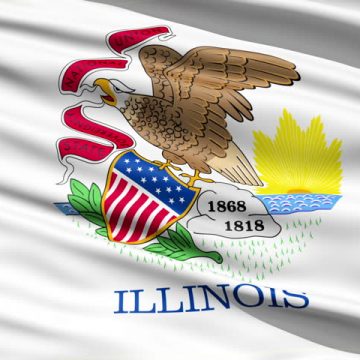
After a flurry of activity in the General Assembly that raised hopes for passage, lawmakers in Illinois have ended this year’s legislative session without acting on bills for online gaming, poker, and daily fantasy sports (DFS).
In the final week of the legislative “short session” (usually convened to take a second look at bills that either Governor Bruce Rauner had vetoed or other legislation that discussion had made more palatable), bills regarding online gaming and poker were revived. Along with those two components of online gaming, DFS got a second look. As the clock ticked, however, neither effort was able to get any energy going forward and no action in any committees – let alone an actual vote on the floor of either house of the General Assembly – was taken by the close of the session.
Legislators had been looking at one bill that could have been fast-tracked. H479, otherwise known as the Fantasy Sports Contest Act, would have opened the Land of Lincoln for regulated online DFS gaming. That bill had been passed in the Senate during the spring, but the House was the one dragging their feet on the issue. After dragging through the Rules Committee for much of the summer, it eventually died off in House with the end of the legislative calendar.
The possibilities for 2018 are unknown as the Illinois political scene is a convoluted one. Technically a “blue state” with a great deal of casino gaming already existing in the state, it might be logical to conclude that legislators would be able to move forward with online regulations. The population centers of Chicago and East St. Louis are the reason for the progressive stance, however. The remainder of the state is more conservative than its fellow citizens in the city. That conservative streak is notable in its stance regarding social issues such as gambling.
Rauner is also a roadblock that would arise with any legislation. When he was elected in 2014, Rauner ran staunchly against any expansion of gaming inside the state’s borders. While he has been in the Illinois Executive Office, he has allowed for budgetary issues to bog down the government. After coming into office in 2015, Rauner put an immediate freeze on state hiring and discretionary spending, causing issues with the General Assembly and increasing budget strife. In fact, the battle between the two regarding the budget has raged for much of the last two years. The General Assembly, after a veto from Rauner, eventually overrode his veto to enact a budget for the state for the first time in two years.
Highly unpopular in the state of Illinois (his approval ratings are similar to those of the current President of the United States), Rauner has ignored those statistics in running for another term as Governor. The Democrats have, as of yet, chosen a candidate for the top seat in the state.
With their budgetary issues (the state of Illinois has unfunded pension issues that date back 80 years; Illinois’ budget deficit sits at $9.6 billion as of Fiscal Year 2016), it could be thought that such an avenue as online gaming, poker and DFS might be a salve for the state. Initial licensing fees could total into the hundreds of millions of dollars, offering a bit of a respite for the coffers of a fiscally struggling state. With its 12.8 million citizens, it is the fifth most populous state in the country, just ahead of Pennsylvania (which recently passed online casino gaming, poker and DFS regulations for its 12.7 million citizens).
Whether the subject of online gaming regulation comes up next year in the Illinois General Assembly in currently up in the air. Although the DFS regulations stormed through the Senate (currently the Illinois Attorney General, Lisa Madigan, has issued the legal opinion that DFS is gambling and against the law in the state), it isn’t known what stomach the big operators in that genre have for fighting it out in the state. Furthermore, there has been little discussion of online casino gaming and/or poker in general in the legislature, leading one to believe that it isn’t a priority inside the state. As seen from the quick work on DFS in the Senate during the summer, though, Illinois could revive its efforts very quickly and have bills through the legislature at any time. It would be a question as to whether Rauner will sign such legislation, however.















